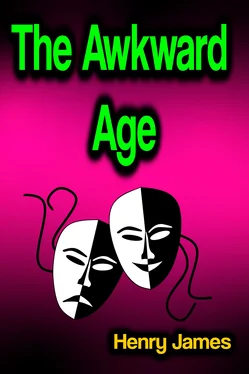1 ...8 9 10 12 13 14 ...21 "I follow you with a sympathy—!" Vanderbank replied. "The situation's reproduced."
"Ah partly—not altogether. The things that are unlike—well, are so VERY unlike." Mr. Longdon for a moment, on this, fixed his companion with eyes that betrayed one of the restless little jumps of his mind. "I told you just now that there's something I seem to make out in you."
"Yes, that was meant for better things?"—Vanderbank frankly took him up. "There IS something, I really believe—meant for ever so much better ones. Those are just the sort I like to be supposed to have a real affinity with. Help me to them, Mr. Longdon; help me to them, and I don't know what I won't do for you!"
"Then after all"—and his friend made the point with innocent sharpness —"you're NOT past saving!"
"Well, I individually—how shall I put it to you? If I tell you," Vanderbank went on, "that I've that sort of fulcrum for salvation which consists at least in a deep consciousness and the absence of a rag of illusion, I shall appear to say I'm wholly different from the world I live in and to that extent present myself as superior and fatuous. Try me at any rate. Let me try myself. Don't abandon me. See what can be done with me. Perhaps I'm after all a case. I shall certainly cling to you."
"You're too clever—you're too clever: that's what's the matter with you all!" Mr. Longdon sighed.
"With us ALL?" Vanderbank echoed. "Dear Mr. Longdon, it's the first time I've heard it. If you should say the matter with ME in particular, why there might be something in it. What you mean at any rate—I see where you come out—is that we're cold and sarcastic and cynical, without the soft human spot. I think you flatter us even while you attempt to warn; but what's extremely interesting at all events is that, as I gather, we made on you this evening, in a particular way, a collective impression— something in which our trifling varieties are merged." His visitor's face, at this, appeared to acknowledge his putting the case in perfection, so that he was encouraged to go on. "There was something particular with which you weren't altogether pleasantly struck."
Mr. Longdon, who decidedly changed colour easily, showed in his clear cheek the effect at once of feeling a finger on his fault and of admiring his companion's insight. But he accepted the situation. "I couldn't help noticing your tone."
"Do you mean its being so low?"
He had smiled at first but looked grave now. "Do you really want to know?"
"Just how you were affected? I assure you there's at this moment nothing I desire nearly so much."
"I'm no judge then," Mr. Longdon began; "I'm no critic; I'm no talker myself. I'm old-fashioned and narrow and ignorant. I've lived for years in a hole. I'm not a man of the world."
Vanderbank considered him with a benevolence, a geniality of approval, that he literally had to hold in check for fear of seeming to patronise. "There's not one of us who can touch you. You're delightful, you're wonderful, and I'm intensely curious to hear you," the young man pursued. "Were we absolutely odious?" Before his guest's puzzled, finally almost pained face, such an air of appreciating so much candour, yet of looking askance at so much freedom, he could only try to smooth the way and light the subject. "You see we don't in the least know where we are. We're lost—and you find us." Mr. Longdon, as he spoke, had prepared at last really to go, reaching the door with a manner that denoted, however, by no means so much satiety as an attention that felt itself positively too agitated. Vanderbank had helped him on with the Inverness cape and for an instant detained him by it. "Just tell me as a kindness. DO we talk—"
"Too freely?" Mr. Longdon, with his clear eyes so untouched by time, speculatively murmured.
"Too outrageously. I want the truth."
The truth evidently for Mr. Longdon was difficult to tell. "Well—it was certainly different."
"From you and Lady Julia? I see. Well, of course with time SOME change is natural, isn't it? But so different," Vanderbank pressed, "that you were really shocked?"
His visitor smiled at this, but the smile somehow made the face graver. "I think I was rather frightened. Good-night."
Part 2 Little Aggie
Chapter
1
Mrs. Brookenham stopped on the threshold with the sharp surprise of the sight of her son, and there was disappointment, though rather of the afflicted than of the irritated sort, in the question that, slowly advancing, she launched at him. "If you're still lolling about why did you tell me two hours ago that you were leaving immediately?"
Deep in a large brocaded chair with his little legs stuck out to the fire, he was so much at his ease that he was almost flat on his back. She had evidently roused him from sleep, and it took him a couple of minutes—during which, without again looking at him, she directly approached a beautiful old French secretary, a fine piece of the period of Louis Seize—to justify his presence. "I changed my mind. I couldn't get off."
"Do you mean to say you're not going?"
"Well, I'm thinking it over. What's a fellow to do?" He sat up a little, staring with conscious solemnity at the fire, and if it had been—as it was not—one of the annoyances she in general expected from him, she might have received the impression that his flush was the heat of liquor.
"He's to keep out of the way," she returned—"when he has led one so deeply to hope it." There had been a bunch of keys dangling from the secretary, of which as she said these words Mrs. Brookenham took possession. Her air on observing them had promptly become that of having been in search of them, and a moment after she had passed across the room they were in her pocket. "If you don't go what excuse will you give?"
"Do you mean to YOU, mummy?"
She stood before him and now dismally looked at him. "What's the matter with you? What an extraordinary time to take a nap!"
He had fallen back in the chair, from the depths of which he met her eyes. "Why it's just THE time, mummy. I did it on purpose. I can always go to sleep when I like. I assure you it sees one through things!"
She turned away with impatience and, glancing about the room, perceived on a small table of the same type as the secretary a somewhat massive book with the label of a circulating library, which she proceeded to pick up as for refuge from the impression made on her by her boy. He watched her do this and watched her then slightly pause at the wide window that, in Buckingham Crescent, commanded the prospect they had ramified rearward to enjoy; a medley of smoky brick and spotty stucco, of other undressed backs, of glass invidiously opaque, of roofs and chimney-pots and stables unnaturally near—one of the private pictures that in London, in select situations, run up, as the phrase is, the rent. There was no indication of value now, however, in the character conferred on the scene by a cold spring rain. The place had moreover a confessed out-of-season vacancy. She appeared to have determined on silence for the present mark of her relation with Harold, yet she soon failed to resist a sufficiently poor reason for breaking it. "Be so good as to get out of my chair."
"What will you do for me," he asked, "if I oblige you?"
He never moved—but as if only the more directly and intimately to meet her—and she stood again before the fire and sounded his strange little face. "I don't know what it is, but you give me sometimes a kind of terror."
"A terror, mamma?"
She found another place, sinking sadly down and opening her book, and the next moment he got up and came over to kiss her, on which she drew her cheek wearily aside. "You bore me quite to death," she coldly said, "and I give you up to your fate."
"What do you call my fate?"
Читать дальше












